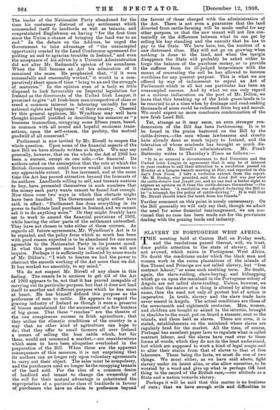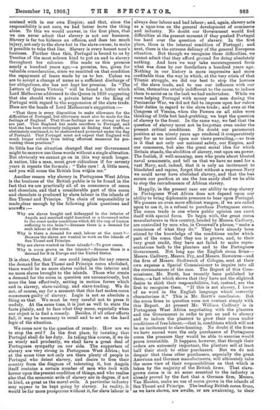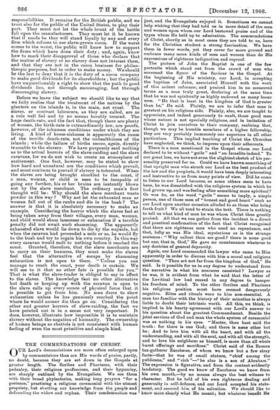SLAVERY IN PORTUGUESE WEST AFRICA. T HE meeting held at Caxton
Hall on Friday week, and the resolutions passed thereat, will, we trust, draw public attention to the state of slavery, real if not avowed, which exists in Portuguese West Africa. No doubt the conditions under which the black men and women work in the cocoa plantations of the islands of San Thom6 and Principe are not called slavery, but "free contract labour," or some such soothing term. No doubt, again, the slave-raiding, slave-buying, and kidnapping which go on upon the mainland in the Portuguese colony of Angola are not called slave-trading. Unless, however, we admit that the nature of a thing is altered by altering its name, then the need not only of protest but of action is imperative. In truth, slavery and the slave trade have never ceased in Angola. The actual conditions are those of the seventeenth and eighteenth centuries. Men, women, and children are bought or seized in the interior, brought in shackles to the coast, put on board a steamer, sent to the islands, and there held as slaves. There are even, it is stated, establishments on the mainland where slaves are regularly bred for the market. All the time, of course, Portugal has excellent paper laws to regulate what is called contract labour, and the slaves have read over to them forms of words, which they do not in the least understand, but which are supposed to work a kind of legal magic and to alter their status from that of slaves to that of free labourers. These being the facts, we must do one of two things. We must either, as we have said above, fight slavery under its latest alias, or else allow ourselves to be worsted by a word and give up what is perhaps tlit best thing in the record of the British race,—our attitude as a State and a nation towards slavery.
Perhaps it will be said that this matter is no business of ours ; that we have enough evils and difficulties to contend with in our own Empire ; and that, since the responsibility is not ours, we had better leave the thing alone. To this we would answer, in the first place, that we can never admit that slavery is not our business. Slavery is far too hideous an offence, and does too much injury, not only to the slave but to the slave-owner, to make it possible to take that line. Slavery is every honest man's business. Further than this, Portugal is bound to us by Treaties of the most solemn kind to put an end to slavery throughout her colonies. She made us this promise nearly a hundred years ago,—a promise, too, given for valuable consideration, since we remitted on that condition the repayment of loans made by us to her. Unless we are to accept a change of name as a sufficient discharge of her obligations, she has not kept her promise. In " The Letters of Queen Victoria " will be found a letter which Lord Melbourne addressed to the Queen in 1838 suggesting that she should write a private letter to the King of Portugal with regard to the suppression of the slave trade. Here are the heads of Lord Melbourne's suggestion :- "That there is every disposition to make allowance for the difficulties of Portugal, but allowance must also be made for the feelings of England. That those feelings are as strong as they are just. That England has made sacrifices to Portugal, and that she has been extremely indignant at finding that traffic, so obstinately continued, to be sheltered and protected under the flag of Portugal. That Portugal must not expect that England will much longer refrain from taking effectual measures for pre- venting these practices."
So little has the situation changed that our Government might to-morrow use these words without a single alteration. But obviously we cannot go on in this way much longer. A nation, like a man, must grow ridiculous if for seventy years it repeats the formula : " Take care ! A little more, and you will rouse the British lion wikhin me."
Another reason why slavery in Portuguese West Africa is the business of the British public is to be found in the fact that we are practically all of us consumers of cocoa and chocolate, and that a considerable part of this cocoa and chocolate is produced by slave labour in the islands of San Thome and Principe. The chain of responsibility is made clear enough by the following plain questions and answfts :— Why are slaves bought and kidnapped in the interior of Angola and marched eight hundred or a thousand•miles to the coast under conditions which fill the cup of human suffering to the brim P—Because there is a demand for such labour at the coast.
Why is there a demand for such labour at the coast ?- Because the slaves are wanted to work on the islands of San Thome and Principe.
Why are slaves wanted on these islands ?—To grow cocoa. Why is cocoa grown on the islands P—Because there is a demand for it in Europe and the United States.
It is clear, then, that if one could imagine for any reason the demand for San Thome and Principe cocoa abolished, there would be no more slaves raided in the interior and no more slaves brought to the islands. Those who create a demand for the cocoa in question are unconsciously, but none the less effectively, setting in motion forces which end in slavery, slave-raiding, and slave-trading. We do not, of course, say for a moment that this fact makes cocoa consumers guilty of slavery. Logic is not so absolute a thing as that. We must be very careful not to press it unduly. At the same time, it is just as well to state the facts plainly, and to face what they mean, especially when our, object is to find a, remedy. Besides, if all other efforts fail, it may be necessary to recall and to act on the hard logic of the situation.
We come now to the question of remedy. How are we to stop the evil ? In the first place, by insisting that Portugal shall do her duty. In taking this course, if we do so wisely and prudently, we shall have a great deal of Portuguese sympathy on our side. The supporters of slavery are very strong in Portuguese West Africa; but at the same time not only are there plenty of people in Portugal who detest slavery, and desire to free their country from the disgrace of tolerating it, but Angola itself contains a certain number of men who look with horror upon the present condition of things, and who realise also that the economic evils of slavery are in degree, if not in kind, as great as the moral evils. A particular industry may appear to be kept going by slavery. In reality, it would be far more prosperous without it, for slave labour is always dear labour and bad labour; and., again, slavery acts as a, upas-tree on the general development of commerce and industry. No doubt our Government would find difficulties at the present moment if they pushed Portugal too hard over the question of slavery. In the first place, there is the internal condition of Portugal ; and next, there is the extreme delicacy of the general European situation. But though we recognise these difficulties, we cannot admit that they afford ground for doing absolutely nothing. And here we may take encouragement from what was done by our forefathers a hundred years ago. Nothing in our history is more impressive and more creditable than the way in which, at the very crisis of that Titanic struggle, we did our best to stop the horrors of the slave trade, and to use our influence with our allies, themselves utterly indifferent to the cause, to induce them to assist us in the task we had undertaken. While we were helping Portugal with money and men during the Peninsular War, we did not fail to impress upon her rulers their duties in regard to the slave trade ; and even at the Congress of Vienna, when the Powers on all sides were thinking of little but land-grabbing, we kept the question of slavery to the front. In the same way, we feel that the question of slavery must not be forgotten even under the present critical conditions. No doubt our paramount position at sea ninety years ago rendered it comparatively easy for us to insist upon our views prevailing,—so true is it that not only our national safety, our Empire, and our commerce, but also the great moral idea for which Britain stands, the abolition of slavery, rest upon sea power. The foolish, if well-meaning, men who prate about bloated naval armaments, and tell us that we have no need for a vast Navy, and, indeed, that it is only an incitement to bloodshed and rapine, forget that without a, supreme Navy we could never have abolished slavery, and that the less secure our position at sea the less easily shall we be able to stop the recrudescence of African slavery.
Happily, in the present case our ability to stop slavery in Portuguese West Africa does not depend upon our ability to bring diplomatic pressure to bear upon Portugal. We possess an even more efficient weapon, if we are called upon to use it, in a refusal to purchase Portuguese cocoa. The cocoa trade is one where public opinion can exert itself with special force. To begin with, the great cocoa manufacturers in this country, headed by Messrs. Cadbury, are controlled by men who, in Cromwell's phrase, " make a, conscience of what they do." They have already been stirred by the knowledge of the conditions under which part of the cocoa that they use is grown, and, to their very great credit, they have not failed to make repre- sentations both to the planters and to the Portuguese Government. Not long ago the English cocoa firms— Messrs. Cadbury, Messrs. Fry, and Messrs. Rowntree—and the firm of Messrs. Stollwerck of Cologne, sent at their own expense a Special Commissioner to inquire into all the circumstances of the case. The Report of this Com- missioner, Mr. Burtt, has recently been published by them,—a fact which shows that they have not the slightest desire to shirk their responsibilities, but, instead, are the first to recognise them. "If this is not slavery, I know of no word in the English language which correctly characterises it." This is Mr. Burtt's conclusion. But the cocoa firms in question were not content simply with this Report. At present Mr. William Cadbury is in Portuguese West Africa negotiating with the planters and the Government in order to put an end to slavery and to induce the planters to grow their cocoa under conditions of free labour,—that is, conditions which will not be an incitement to slave-hunting. No doubt if the firms we have named were the only purchasers of Portuguese cocoa the pressure they would be able to exercise would prove irresistible. It happens, however, that though their orders are extremely important, the planters sell at least half their stock to other purchasers. But we do not despair that these other purchasers, especially the great American and German manufacturers, will ultimately take the same view of their responsibilities as that which is taken by the majority of the British firms. That slave- grown cocoa is in no sense essential to the industry is already proved by the fact that a German firm, Messrs. Van Houten, make no use of cocoa grown in the islands of San Thome and Principe. The leading British cocoa firms, as we have shown, are awake, or are awakening, to their
responsibilities. It remains for the British public, and we trust also for the public of the United States, to play their part. They must not let the whole brunt of the battle fall upon the manufacturers. They must let it be known that if needs be they will stand loyally by any and every firm which refuses to use slave-grown cocoa. If the worst conies to the worst, the public will know how to support the firms which have done their duty ; and, again, know how to mark their disapproval of those who declare that the matter of slavery or no slavery does not interest them, and that they are not in the cocoa business for philan- thropic purposes, but in order to make money. We should be the last to deny that it is the duty of a cocoa company to make good dividends for its shareholders ; but the public have unquestionably a right to show that the path to good dividends lies, not through encouraging, but through discouraging slavery.
Before we leave the subject we should like to say that we fully realise that the treatment of the natives by the planters on the islands is, in the main, not cruel. The slaves, or contract labourers, as they are called, are as a rule well fed and by no means harshly treated. The huge death-rate, and the fact that, though there are plenty of women, the birth-rate is extraordinarily low, are proofs, however, of the inhuman conditions under which they are living. A kind of home-sickness is apparently the cause of the terrific death-rate, not the unhealthiness of the islands ; while the failure of births seems, again, directly traceable to the slavery. We have purposely said nothing as to the actual horrors of the slave-raiding and the slave caravans, for we do not wish to create an atmosphere of excitement. One fact, however, may be stated to show how hard and unnatural are the conditions which prevail, and must continue to prevail if slavery is tolerated. When the slaves are being brought shackled to the coast, if a man, woman, or child is seen to be incapable of going any further, his or her brains are instantly blown out by the slave merchant. The ordinary man's first thought will be: Why should the slave merchant waste powder in this way ? Why not let the exhausted man or woman fall out of the ranks and die in the bush ? The answer is that it is absolutely necessary to make an example. Considering the horror which the slaves feel at being taken away from their villages, every man, woman, and child would sham lameness or exhaustion if a terrible penalty did not await such shamming. The apparently exhausted slave would lie down to die by the wayside, but when the caravan had proceeded a mile or so, be would fly to the bush and try to regain his own country. In this way every caravan would melt to nothing before it reached the coast. Granted, therefore, that the slave merchants are to carry on their business, they must make the slaves feel that the alternative of escape by shamming exhaustion is not open to them. "Unless you can manage to reach the coast, your death is certain. We will see to it that no other fate is possible for you." That is what the slave-trader is obliged to say in effect to the slaves. The knowledge that no other alternative but death or keeping up with the caravan is open to the slave calls up every ounce of physical force that it is possible to get from him. No man dares to show exhaustion unless he has genuinely reached the point where he would sooner die than go on. Considering the other and greater horrors of slave-raiding, the fact we have pointed out is in a sense not very important. It does, however, illustrate how impossible it is to maintain slavery without the negation of humanity. The ownership of human beings as chattels is not consistent with human feeling of even the most primitive and simple kind.
































































 Previous page
Previous page